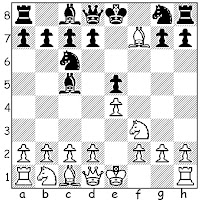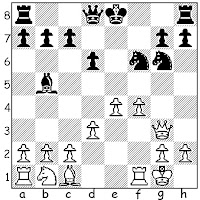Here is the second kind of Jerome Gambit game that I encounter, where my opponent and I toss the game back and forth, and there are plenty of chances for me to take the advantage and run.
Sometimes, like in the following game, I do so.
perrypawnpusher - charlyeliot
blitz, FICS, 2013
1.e4 e5 2.Nf3 Nc6 3.Bc4 Bc5 4.Bxf7+
4...Kxf7 5.Nxe5+ Nxe5 6.Qh5+ Ng6 7.Qd5+ Ke8 8.Qxc5 d6 9.Qe3 Nf6
A familiar position - I've been here over 40 times, scoring over 80%.
10.0-0 Bd7 11.f4
Standard pawn play for me, but perhaps 11.d4 was a bit better.
11...Bb5
Or 11...Qe7 as in perrypawnpusher - peroneal, blitz, FICS, 2009 (½-½, 56).
12.d3 Ng4 13.Qg3 Nf6
The Knight returns home. From a different perspective, 13...Qh4, looking to exchange Queens, was playable. (Curiously, an almost identical position after 13...Qh4 occurred in Wall, B. - Guest3312852, Playchess.com, 2012 [1-0, 26], only Black's Bishop was on c4 and White's Knight was on c3.)
14.Nc3 Qd7
I occasionally use Houdini 3 to help me understand what is going on. Using "blunder check" set at 5 minutes per move, the program boiled the game down to the basics: 14...Bc6 15.f5 Nf8 16.d4 h5 17.Re1 Kf7 18.Bg5 Kg8 19.e5 dxe5 20.dxe5 h4 21.Qf4 Nd5 22.Qd2 Qd7 23.e6 Qd6 24.Nxd5 Qxd5 25.Qxd5 Bxd5 26.e7 Bc6 27.exf8Q+ Rxf8 28.Re5 Rh5 29.f6 gxf6 30.Bxf6 where White has a small, but perhaps not decisive edge.
Who knew?
15.f5
This move is okay, but I missed 15.e5 dxe5 16.fxe5 Nd5 17.e6!? which sets up the tactical shot 17...Qc6 18.Nxd5 Qxd5 19.c4 winning a piece.
15...Ne5 16.d4
This exchange sacrifice is not good.
16...Nh5
Trying to complicate things, when 16...Bxf1 17.dxe5 dxe5 18.Qxe5+ Kf7 19.Kxf1 Rhe8 20.Qf4 Qe7 would leave Black with an edge.
17.Qg5 Bxf1 18.Qxh5+
This allows Black's other Knight to escape directly, whereas Houdini 3's choice was: 18.dxe5 g6 19.e6 Qg7 20.Kxf1 c6 21.Kg1 h6 22.Qg4 Nf6 23.Qf3 Rg8 24.h3 Rd8 25.Ne2 gxf5 26.exf5 Ke7 27.g4 Nd5 28.c4 Nb4 with advantage to White.
18...Nf7 19.Kxf1 Qc6
The smoke is clearing, and White has two pawns for the exchange.
20.Be3 Qa6+ 21.Kg1 Qc6 22.e5 dxe5 23.dxe5 g6 24.fxg6
Stronger was 24.Qh3 gxf5 25.Rf1.
24...Qxg6 25.Qxg6
Exchanging favors. Black should have captured on g6 with the pawn, and White had a much better choice in 25.Qe2!?
25...hxg6 26.Bd4 Rh6 27.Nd5
There is still a fight going on. Black should now protect his c-pawn with his Rook, as his choice of moves allows another tactical shot (which I missed).
27...Kd7 28.Rd1
Instead, 28.e6+!? wins material.
28...Kc6 29.Nb4+ Kb5 30.Nd3 a6
More slipping and sliding.
31.Nf2
Missing a chance to show some cooperation among my pieces, winning material: 31.a4+ Kxa4 (31...Kc6 32.e6 Kd5 33.Nf4+ Ke4 34.exf7 Kxf4 35.Bc3 Rh7 36.Rf1+ Ke4 37.f8Q Rxf8 38.Rxf8 ) 32.b3+ Kb5 33.c4+ Kc6 34.e6 Nd8 35.Nb4+ Kd6 36.Bg7+ Kxe6 37.Bxh6.
31...Rd8 32.h3
And the game is about even.
32...Kc4 33.Bc3 Re8
Exchanging Rooks was the right idea. Now Black gives back the exchange, and White starts pushing things.
34.Ng4 Rh5 35.Nf6 Rd8 36.Rxd8 Nxd8 37.Nxh5 gxh5
38.Kf2 Ne6 39.Kg3 b5 40.Bd2 Kd5 41.Bf4 Nxf4 42.Kxf4 c5 43.g4 hxg4 44.hxg4 c4 45.g5 b4 46.g6 c3 47.b3 Ke6 48.g7 Kf7 49.Kf5 Kxg7
50.Ke6 Kf8 51.Kd7 a5 52.e6 Kg7 53.e7 Kf7 54.e8Q+ Kg7 55.Ke7 Kh7 56.Qf8 Kg6 57.Qf6+ Kh7 58.Qg5 Kh8 59.Kf7 a4 60.Qh6 checkmate














 4...Kxf7 5.Nxe5+ Nxe5 6.Qh5+ Ng6
4...Kxf7 5.Nxe5+ Nxe5 6.Qh5+ Ng6  7.Qd5+ Ke8 8.Qxc5 d6 9.Qe3 Nf6
7.Qd5+ Ke8 8.Qxc5 d6 9.Qe3 Nf6  10.0-0
10.0-0 







 As per the note after White's 26th move.
As per the note after White's 26th move.






 7.Qd5+ Ke8
7.Qd5+ Ke8 










 So far, so good. My extra pawn is protected and passed.
So far, so good. My extra pawn is protected and passed.

